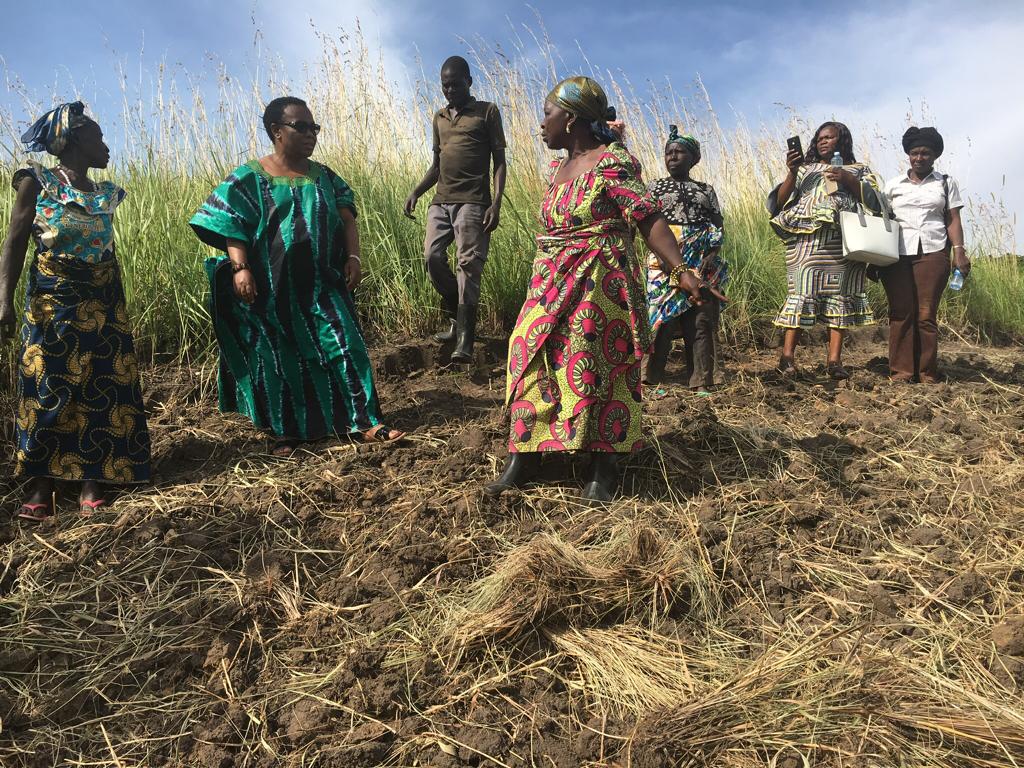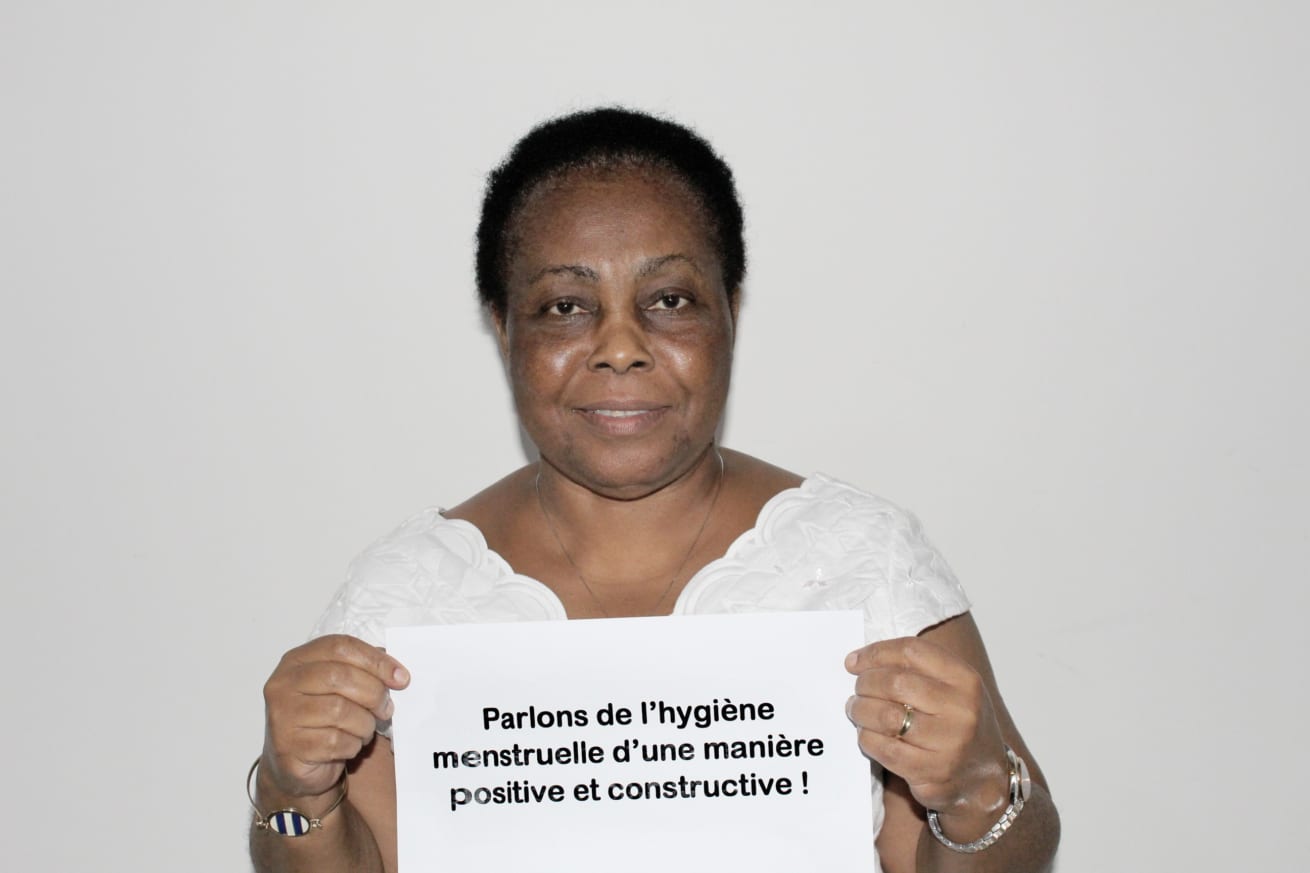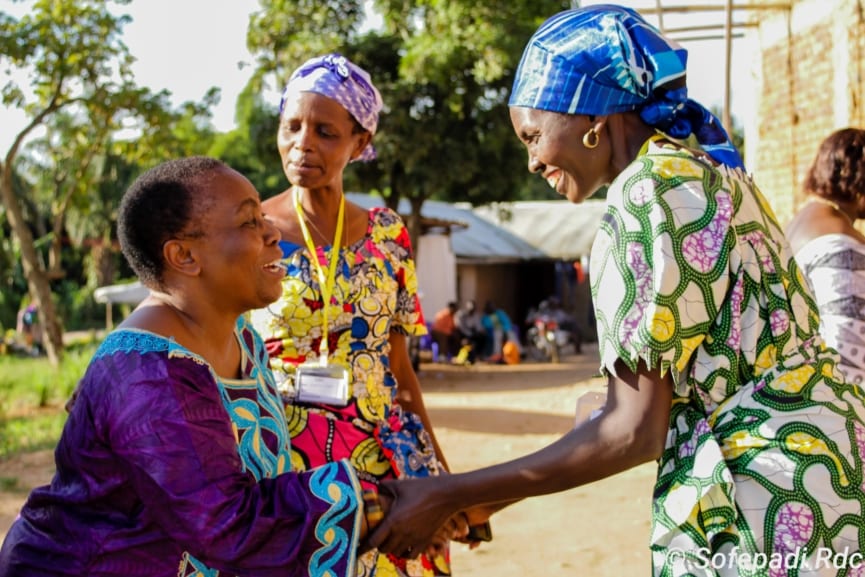Dear Colleagues,
Today, I am deeply honored to interview WFN member Julienne Lusenge, Executive Director of the Fonds pour les Femmes Congolaises (FFC), or the Fund for Congolese Women in the Democratic Republic of Congo. Julienne was recently awarded the International Woman of Courage Award by the U.S. Department of State for her tireless activism and leadership in promoting the rights of women and girls in conflict situations.
Let’s learn more about who Julienne is and the crucial work that led to this wonderful award.

Elizabeth Barajas-Román (EBR): Director Lusenge, it’s so great to get to “speak” with you like this. The pandemic has brought challenges with working globally in a digital age, but in many ways, has also brought us closer in our efforts to uplift our global partners and their work in various corners of the world. What issues have the Congolese women in your community been facing during the pandemic, and what priorities do you see to an equitably recovery?
Julienne Lusenge (JL): During the pandemic, what we have seen is an increase the precariousness of women’s and girls’ situations and heightened vulnerability, emphasizing gender inequalities. From our network of focal points in the provinces, we have received reports of increased sexual assault, rape, early marriages, unwanted pregnancies, and girls turning to prostitution for survival. The lockdown, which closed schools, was particularly hard on youth, leaving many aimless. Economically women were hit hard as they are often the bread-winners for the family, engaging in the informal economy.
Priorities that emerged from this crisis – no surprise to feminist activists – are renewed efforts to move the needle on gender equality – starting with a COVID-19 response.
FFC first addressed the urgent needs born of the pandemic by funding 11 projects to address COVID-19. All of these projects focused on raising awareness, on developing good practices using barrier measures, complementing the Congolese government and the World Health Organization. In addition, these projects placed a strong emphasis on women’s and girls’ rights during confinement.
Interventions and approaches to project execution included:
- Door-to-door sensitization with megaphones along avenues and markets;
- FFC also encouraged doctors and their team early on in the pandemic as they were met with harsh criticism from the community. It was important to encourage the men and women who were risking their lives to save others.
- Handing out of leaflet messages and explanation of barrier gestures, with additional information provided on sexual and gender-based violence, abuse, and exploitation of children;
- Distribution of masks, hand sanitizer, liquid, and solid soaps to members of targeted households and senior citizens identified in their project intervention areas;
- Handwashing machines distributed to households, health facilities, and police stations;
- Dissemination of messages through community radio stations using loudspeakers;
- Use of Bluetooth and WhatsApp on mobile phones, mainly in markets, to broadcast messages lasting 3 to 5 minutes.
- Psychological care for patients, families, and victims of sexual assault.
Results of these efforts include:
- Through targeted outreach, over 30,000 people, including 21,000 women and girls, were reached and informed about safety measures for Covid-19 and for gender-based violence.
- A youth-led organization focused on raising awareness among young people, and reached approximately 2,000 young people, including 1,340 girls, who were informed about preventive measures against Covid-19, but also against all forms of violence and ways to denounce such violence. Among these girls, many have themselves become advocates, demonstrating the multiplier effect.
- Approximately 5,000 people received free masks distributed through FFC-funded emergency projects. Recipients also received guidance on correct mask usage.
- Young women who are seamstresses made and sold masks, contributing to an increase in their income.
- Over 250 handwashing stations, 250 bottles of hand sanitizer, and 1,500 liquid and solid soaps were distributed to the poorest households
Later in 2020 we launched a call for proposals targeting sexual and reproductive health. We are funding 56 of the over 180 projects that we received throughout the country, focusing on comprehensive education for women’s rights including the Maputo Protocol.

EBR: What have your funding priorities been during this time?
JL: Our funding priorities have been on the pandemic and on sexual and reproductive health education and services. I would like to share one project with you – a project from a youth group in Kinshasa called Salama Glamour. Led by Rachel, a young woman who is passionate about gender equality, this youth group created several videos for their communities that addressed the dual issues of the pandemic and violence in the home. They conceived of the idea, wrote the script, and were even actors in the video that I am sharing with you here. These videos were posted on social media and shared on local TV to reach a maximum amount of people. The impact of this project? Thousands of people knowing about the harm done through domestic violence, how they need to focus on their children, and empowered youth group, and positive ripple effects int eh community. It is for projects like these that FFC exists.
No to child abuse during confinement! Every child born has a right to be loved – An educational video by Salama Glamour.
During the pandemic I have also been on television several times to raise awareness and draw attention to domestic violence. We at FFC were the first to launch this alert.
EBR: Julienne, you were recently awarded the International Woman of Courage Award by the U.S. Department of State for your tireless activism and leadership in promoting the rights of women and girls in conflict situations. Now in its 15th year, the Secretary of State’s IWOC Award recognizes women from around the globe who have demonstrated exceptional courage and leadership in advocating for peace, justice, human rights, gender equality, and women’s empowerment – often at great personal risk and sacrifice. Tell me about the work you and your Fund is leading that led to this incredible award?
JL: Before FFC, in 2000, I co-founded the organization Solidarité Féminine pour la Paix et le Développement Integral (SOFEPADI). This organization, which has its headquarters in Bunia in the province of Ituri in the East, is now 20 years old. SOFEPADI provides holistic care for survivors of sexual and gender-based violence through medical, psychological, legal, and family support. SOFEPADI also leads the reintegration of assault survivors into their communities, including the support for children born of rape.
Through the Karibuni Wa Mama Medical Center, part of SOFEPADI, we offer holistic support (medical, legal, and phycho-social support) to victims of sexual violence. It is within the framework of my work with this organization that I lead the fight for justice for victims at the national and international levels.
As needed as the work of SOFEPADI is, I still saw the need to address larger issues of gender-based violence and the lack of women in decision-making spaces. This is why I co-founded the Fund for Congolese Women (FFC) in 2007. As the only women’s fund in the Congo, we support women’s groups and associations financially and technically. We intervene to support women’s groups working on access to politics and in the fight against all forms of violence against women and girls including sexual violence. We intervene to support the collective efforts of women working to fight discrimination and the restoration of peace, reproductive health, and in addition, we do a lot of advocacy work so that women’s groups and organizations can speak to the authorities and defend their rights themselves.
By providing both grants and technical support to accompany projects, we not only fund a project but also incorporate key learnings and best practices on project management cycles, as well as improved report writing and budget tracking. In essence we give these smaller, often informal groups, the means and knowledge to formalize to a degree so that they can start to seek funding on their own. We are creating an army of women-led associations across the nation that are slowly but steadily pushing the women’s movement forward.
FFC puts women and girls into the role of leader, determining the changes they want in their lives. By giving women and youth the means to reclaim control of their bodies during a time in which GBV and sexual assault are even higher, we are addressing the urgent need born from the pandemic and the long-term health of these communities. Sustainability and inclusivity are built into our projects because they are conceived of, and led by, those most affected.
FFC is also an advocacy organization that engages in local, national, and international spaces to bring the voices of Congolese women to multiple fora to share challenges and demand accountability and change. Due to our extensive network and reach into the most rural areas of the nation, we are confident that our advocacy reflects the experiences and voices of the most marginalized. Our engagement with numerous civil society partners is moving the needle on women’s rights in the DRC, and across the Great Lakes region.
Beyond advocacy with local authorities, FFC also actively engages in advocacy at the regional, national, and international levels, elevating grassroots women’s voices to those in power. Advocacy with authorities is a means to change the perception of those in power and to orient their decisions in accordance with the principles of gender equality. Our dual-prong approach means that our advocacy complements the grassroots work, coupling women-positive changes both on the ground and within key institutions.
I have the privilege of speaking on behalf of Congolese women, and the IWOC award is as much for me as it is for them.
EBR: Given how crucial this work is to your local communities, I’m not surprised that you were recently awarded the international Woman of Courage Award from the United States State Department. In addition, your role as gender expert on the presidential panel for the African Union is essential to lifting up marginalized communities. What are your goals on the council, and what efforts are they spearheading to combat violence and ensure safety for women and girls?
JL: It is an honor and a privilege to serve on his Excellency’s, President Tshisekedi’s, panel of experts. I am one of two women on this six-person panel and am responsible for leading and contributing to many thematic areas that are the priorities of the President and within his mandate to lead during his AU chairmanship. Specifically, I am working on advancing the issues of Women, Peace and Security, Good Governance, Democracy, Elections, Human Rights and am in contact with members and organizations of Civil Society. It is not a small job!
For example, one aspect I am focused on this May is discrimination due to menstrual hygiene for girls and women of childbearing age. We are planning a key event on May 28th in Kinshasa to highlight the need to dispel myths and stereotypes around menstruation that continue to harm girls and their abilities to go to school and on other forms of discrimination. This is an issue in the DRC and throughout the continent. By participating in a larger campaign to counter these stereotypes we are elevating the issue and bringing it out of silence and shame.

By having the panel and the chair to support such a campaign to make menstruation visible and to normalize it, we are joining with other women’s groups throughout the country and the continent to say enough is enough. Girls and women shouldn’t face discrimination or shame for something natural and the very thing that allows us to become mothers, who are figures of respect.
This campaign is running under #MenstruesSansContraintes (#MenstruationWithoutConstraints).
Something else I’m working on is a landmark conference to be held in Kinshasa on June 10, 2021. This is a conference directly connected to the Paris Generation Equality Forum that will have heads of state from African Union member states, eminent leaders of UN Women and FGE, ambassadors, gender experts and members of civil society, gather for one day to put gender equality firmly on the road map for the African Union through the creation of a document entitled “Declaration of Kinshasa.” This declaration will detail commitments and concrete actions to lead the DRC and African Union member states toward more gender equality, less violence against women, and toward more peace.
I am hopeful and proud to be a part of this momentous effort that will undoubtedly have a net positive impact on women and girls across the entire continent.
EBR: Julienne, it was so great to get to know you a little better. Do you have any final advice for the philanthropic community when centering women and girls in their investments and giving?
JL: We depend on the international philanthropic community to partner with us by investing directly in local organizations, such as FFC. We are here as local actors most intimately connected to the problems. We also know how to make change happen. We bring decades of expertise, technical know-how, a nuanced understanding of cultural contexts, and the ability to speak in multiple, local languages. What we know is that once women are resourced, they can best respond to their situations and bring a sustainable change. They are able to do the nuanced work of changing mindsets within their communities. This results in more gender equality, economic empowerment, and peace.
So really, the most important piece of advice I can give to the philanthropic community is to invest in local or national women’s organizations. Find us. Reach out to us. Start from the foundation of a trust-based relationship. Perhaps you have heard the mantra ‘shift the power’? There is a lot of funding intended to help the Congo. But that funding often stays with international organizations within their administrations. We want the funding to be given to women’s groups because we are the ones to bring change. We are the agents of change. During the confinement, the international NGOs stopped humanitarian work, and it was – is – the women who are on the frontlines even without means. We cared for the sick, we responded to basic needs, we worked for the prevention and acceptance of this existence new disease.
We cannot do this work without the international philanthropic community or our global network of women’s funds. We appreciate your solidarity as it invigorates and encourages us. As we say frequently in the Congo, “on est ensemble” (we are together).

Julienne Lusenge is a tireless and fearless advocate for justice, peace, and gender equality in the Democratic Republic of the Congo. In 2001, she became the Co-Founder and President of Women’s Solidarity for Peace and Integral Development (SOFEPADI), an NGO working for the promotion of women’s and girls’ rights and on sexual and reproductive health in eastern DRC. Born out of the need for broader women’s rights advocacy, she formed the Fund for Congolese Women (FFC) in 2007 and currently serves as the organization’s Executive Director. Early in 2020, she was recognized by the United Nations as the first of twenty ‘women to watch’ for her advocacy. She is also a top five finalist for the 2021 Aurora Humanitarian Initiative. Currently a member of the High Panel in charge of accompanying his Eminence Félix Antoine Tshisekedi president of the DRC in the DRC-AU mandate for the year 2021-2022, Ms. Lusenge is in charge of the critical issues of Women, Peace and Security, Good Governance, Democracy, Elections, Human Rights and is in contact with members and organizations of Civil Society.
